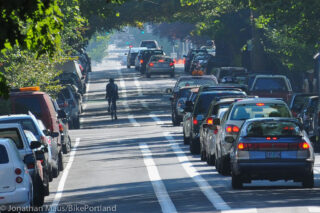
(Photo: J. Maus)
If left to their own devices, it’s very likely that any money raised by the Oregon Department of Transportation via decongestion pricing (also known as value pricing or congestion pricing) would be funneled right back into projects to make driving easier.
That would be a very bad move. Portland-based non-profit The Street Trust has launched a petition to encourage ODOT to do otherwise.
“Tell ODOT,” the petition headline reads, “Get Serious About Traffic and Invest in Transit, Biking, and Walking.”
Here’s the rest of The Street Trust’s call to action:
Building wider highways will not reduce traffic congestion. Instead, we can use congestion pricing as a method to reduce the number of cars on our streets and invest in better choices like walking, bicycling, and public transit. By following the example of cities like London, Stockholm, and Singapore, we can reduce traffic congestion and lead the nation in making it safe and easy to get around without a car. Congestion pricing must avoid negative impacts on low income people with options like rebates and increased transit.
We call on the Oregon Department of Transportation to use congestion pricing to reduce cars on our streets and fund a sustainable vision for the future of our city.
Advertisement
The Street Trust (whose Advocacy Director Gerik Kransky is on the Value Pricing Committee) has reason to be worried.
As per House Bill 2017, the transportation funding and policy package that passed last year, net proceeds from decongestion pricing must go into a newly established pot named the Congestion Relief Fund. While you might think the best way to relieve congestion is through better land-use, transit service, and good bikeway networks — ODOT and state legislators don’t. When they hear congestion relief, they think of wider freeways, more lanes on freeways, bigger ramps on and off freeways, and so on.
The largest expenditures in HB 2017 (which ODOT calls the Keep Oregon Moving program) are “congestion relief” projects that will widen Interstates 5, 205, and Highway 217. The I-5 Rose Quarter project itself will get $30 million per year starting in 2022.
If advocates have any hope of allowing decongestion pricing revenue to be spent on better bus service or bikeways, they’ll have to decouple the idea that “congestion relief” is synonymous with “freeway project.” This campaign by The Street Trust is likely just the start in a much larger battle that will unfold in the weeks and months to come as the Value Pricing Committee finalizes its recommendation to the Oregon Transportation Commission. That’s expected to happen this summer.
Learn more about ODOT’s decongestion relief policy and process here.
— Jonathan Maus: (503) 706-8804, @jonathan_maus on Twitter and jonathan@bikeportland.org
Never miss a story. Sign-up for the daily BP Headlines email.
BikePortland needs your support.



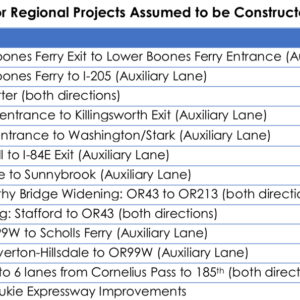
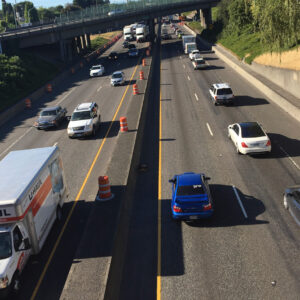
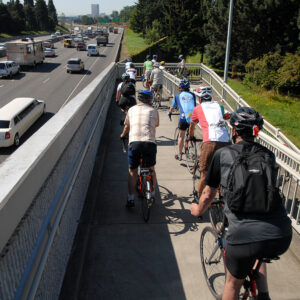
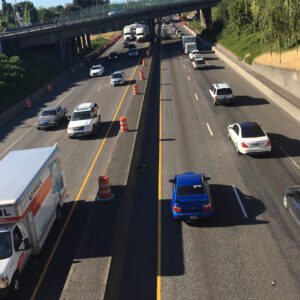
Thanks for reading.
BikePortland has served this community with independent community journalism since 2005. We rely on subscriptions from readers like you to survive. Your financial support is vital in keeping this valuable resource alive and well.
Please subscribe today to strengthen and expand our work.
ODOT’s idea of congestion relief was the Mt. Hood freeway. We need to be loud and clear that it is time for a leadership and cultural change at ODOT. Thank you to the Street Trust for continuing to shine the spot light on this out of control freeway construction company.
Isn’t it amazing that ODOT seems to be able and inclined to screw up just about anything, if left to its own devices? Where do they get these loser ideas?
Here in southern Oregon its the same deal. City of Phoenix was attacked with a road diet on 99. Nobody wanted it and the town demanded 99 be returned to 2 lanes in each direction. As a cyclist I even thought it was stupid make work to gift a construction industry. 4 miles south in Talent were being assaulted with the same nonsense on a perfectly good formerly four lane headed towards Ashland which screwed up their 99 section called north Main a decade ago. I’m a cyclist and of the opinion that restrictiong auto traffic is counterproductive and causes unnecessary angst among drivers. I HATE road diets unless they’re deployed in urban core areas full of multi mode traffic where they’re needed, not as a political agenda serving unknown interests.
That doesn’t sound like the same deal at all. It sounds like traffic calming in small town Oregon. People in a hurry there can take I-5. Why not re-configure 99 to act more like a main street in the small towns it runs through?
Yeah, I just looked up that section of 99. I-5 is less than 1000′ away, and there are on and off ramps in Medford, Phoenix, and Talent. Taking I-5 vs the highway adds a couple minutes max. I’m sure those small towns could use some more people slowing down and doing business on main st, instead of just flying through. I’m also tired of the “I’m a cyclist, BUT” spiel…
Using the money to bolster other forms of transportation makes a lot of sense, but it would be political suicide. Congestion pricing will be very unpopular regardless, but “giving our money to bikes” will make it utterly untenable.
Taxing cigarettes probably wouldn’t have been endorsed by smokers either, which is probably why we didn’t ask them for their opinion.
And are you now (by analogy) suggesting we spend cigarette tax revenue on better access to cigarettes/pithiest advertising campaigns, to avoid what you call political suicide?
I’m suggesting that congestion pricing is going to be a heavy political lift, regardless of what the funding is used for, and what the TST is proposing will make it that much harder.
Sometimes you have to do something out of principle (like tax cigarettes or gambling or car parking or motor fuel) not field test the idea with constituencies who may object.
Your approach, to the extent that I understand it, will never get us where we know we need to go, because there will always be some vested interest, constituency, party, who would prefer to keep getting something for free, not pay to correct the social or other ills their particular habit or behavior or mode choice bequeaths to everyone else.
And why, if as you suggest it is such a heavy political lift, have others managed to institute it?
It’s not that “people will object”. It’s that politicians may not support it if too many people rise up in opposition. I don’t know the politics of VA, but I do have some sense for how things work here.
Heck, I hope I’m proven wrong, and we get a nice rich funding stream for transit and active transportation while reducing highway congestion and everyone is happy.
Taxing cigarettes took years of education before it became acceptable and was able to pass the voters. It was also an easier tax to pass where the majority, non-smokers, where able to vote in a tax on ‘other people’ who smoke. Basically the population had to do a 180 from smoking is acceptable and you have a right to do it in public, to smoking is a dirty unhealthy habit that should be taxed.
To get to that point there was probably ten years of very public lawsuits against the cigarette companies. The settlements provided funding for years of anti-smoking commercials,followed by smoking bans in public places and finally a tax.
The key thing is education. It will be difficult to legislate change if the majority doesn’t support it and scaring people into change doesn’t work either. Much like the “give a hoot, don’t pollute’ campaigns of the past there needs to be a broad campaign as to how the tolls will benefit the drivers and the community as a whole.
No, but we did allow health advocates pretend that the money was being charged to benefit smokers past, present and future. Over time, we finally admitted that it’s just another “sin tax” revenue source.
By all means, put it out there that this is a sin tax cash grab from day one and you will see it soundly defeated. I think we’re all bright enough to realize that in Portland’s current political climate, none of the money redirected to other sources would go to reducing congestion on this particular stretch of road.
But hey, it’s another chance for advocates to lie and say their position isn’t anti-car. Look, you’re welcome to your position. I’m just amazed that you think you have any credibility left with anyone.
“sin tax cash grab”
tell us what you really think.
So, you’re willing to admit that cars are a sin?
That’s a step in the right direction! 😉
This campaign really seems to add to the picture that The Street Trust was either steamrolled or outmaneuvered in this transportation bill. Yes, they managed to secure funding for Safe Routes to School specifically and transit more generally but it ostensibly came at the price of a sales tax on (pretty much all, with the update earlier this year) new bike sales, minimal new funding for bike-related projects, and failing to direct any proceeds from congestion pricing to projects that would actually relieve congestion (transit or bike).
What projects, specifically, do you think would reduce congestion on this specific stretch of road?
Do you think that project is the one that would get funded if toll money was redirected to transit?
Not sure what you mean by “this stretch of road” given that the proposals range from tolling the Abernethy Bridge to tolling all of I-5 and I-205 from the Columbia River to where the highways merge with options in between.
If you want to look at a list of projects that will reduce congestion throughout the highway system build out the 2030 Bicycle Master Plan utilizing best practices that have been developed over time to encourage the 8-80 age group that is the target of this network. At a total cost of $600 million (likely a higher price tag at this point, but ODOT isn’t good at estimates either) it would be a bargain compared to other proposed uses of this money. It would also provide opportunities to retool roads to prioritize transit where necessary and serve Vision Zero by reducing miles traveled by cars and increasing safety for people who use the public right-of-way for all modes of travel. This would make travel around the city safer, more predictable, and less frustrating for those who make the decision to drive.
Can you point to an example of another state’s transportation package that dedicated more to walking and biking? There are nine figures – over $125,000,000 – in HB 2017 – for walking and biking, as well as big historic support for transit operating funds.
But yes, the biking/walking/transit lobby isn’t all-powerful in Oregon. We need to build more power in the future. The referral process generally means deep-pocketed interests can refer things to the ballot if they don’t get their pork. If you have plans to boost power, we’d love to hear them.
The funding you are referencing is exclusively for Safe Routes to Schools which in the context of a $5 billion bill is a whopping 2.5% and only was included because they couldn’t ignore those modes entirely without some degree of backlash and it’s funding where they can say “we’re helping all these children.”
Unfortunately I don’t keep track of other states’ transportation bills so no idea how this one ranks. Given all of the talk of a carbon tax and being environmentally conscious from Oregon Lawmakers a bill like this demonstrates that they aren’t serious about this or are poorly educated on the role that transportation plays. A third option is that most of many lobbyists are similarly ignorant of how to actually solve congestion which infects those without a decent level of transportation knowledge.
As for increasing “power” it’s a simple answer: get involved. Run for local office, join a committee within your local jurisdiction, volunteer with advocacy groups like BikeLoudPDX. The more people with a different narrative are in positions to sway public opinion or those of their peers the more we won’t need an “all powerful walking/biking/transit lobby” because it will be an expectation of voters that these things are funded rather than them being something of an afterthought (yes, the transit funding falls into the latter bucket).
Sadly, I do not think that ODoT (or Oregon legislature) can sell the initial concept of roadway pricing other than as a “[roadway user] congestion reduction” …especially in a state that has no modern history of roadway tolling or other congestion pricing programs (other than legacy ferries)…my recommendation would be to tweak it either through legislative process (allow ODoT region 1 / areas with a population ~> 600k to use the funds for all types of congestion relief) or administrative (update the definition of congestion to address all forms of solutions).
This is why its a terrible idea. It penalizes the poor who have less options to live near work, then uses the money to only create even more car dependence, trapping them further. When people complain about the charges, ODOT will say its what the active transport group wanted, thus triggering bike-lash. Its a loose loose loose for everyone except the rich and ODOTs anti active transport agenda.
Let’s get a sensible congestion pricing system in place (value pricing, tolling, whatever you want to call it). Then we can fight the unnecessary freeway projects (while, I hope, admitting that there are some necessary ones).
From the ODOT site:
After reading that statement it’s hard to imagine a scenario where ODOT would spend this new revenue in a manner that would promote transportation equity.
If correct, that actually gives ODOT a freer hand than I thought they had.
Yeah…a freer hand to continue what they have been doing for decades.
Yep, the constitutional restriction doesn’t stop them at all from supporting multiple modes. It just means they can’t spend it on buying transit vehicles, operating transit vehicles, or supporting projects outside the right-of-way like grade-separated rail or a bike path like the Columbia Slough Trail that is not parallel to a road. But it can be used for ped, bike, and transit capital projects within or adjacent to any roadway.
As if spending money on anything besides highway construction decreases the money that flows through ODOT.
I used to vote democrat, but switched to republican because of people like you…
I like to drive because it is my freedom — you all want to take away our cars, or atleast take away our roads and make us pay for your bike lanes
“you all want to take away our cars, or atleast take away our roads and make us pay for your bike lanes”
My vote for the comment of the week.